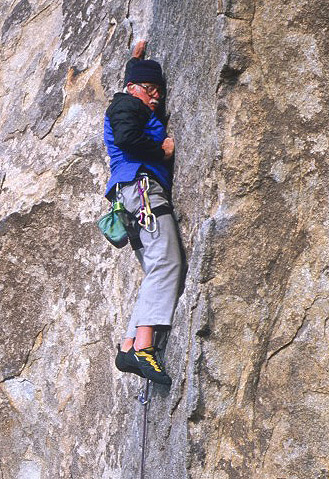www.johngill.net
| Senior Athletes : Allen Steck 2007 |
 Cryptic JT |
|
Allen Steck Questionnaire Section
A.
1.
Year of birth:
19262. Height & weight (now and at younger age): At age 30: 5’ 10 ¾; 155 lbs. At age 80: 5’ 7 ¼; 161 lbs. 3. Year you began rock climbing and/or bodyweight athletics: 1946
4. Are you retired? Still working?: Retired 5. Is your family supportive of your rock climbing and/or bodyweight athletics: Yes 6. How important is the social aspect of the activity for you?: Very important. Section
B.
1.
Type of rock climbing or bodyweight athletics you now enjoy:
Easy rockclimbing2. Type you enjoyed at a younger age?: Rockclimbing and alpinism 3. Do you engage in auxilliary training or associated athletics?: Just the climbing gym 4. How often do you climb or exercise now? At a younger age (<65)?: Climbing gym twice weekly. Outdoors about 1 time every 3 months. 5. Length of climbing or exercise sessions now?: 2 hrs. each time in the gym. Outdoors about 2 climbs day, say total of 6 hrs. 6. How long does it take for fairly complete physical recovery?: I must rest about two hours after a hard climb. 7. At what level of difficulty do you now climb or what are the most impressive bodyweight exercises you now do? Past levels or performances?: I can often do 10 a/b in the gym as long as there are no overhangs. Same for outdoors; 8. What changes have you observed in strength and endurance over the years?: Grip strength? Arm & upper body strength? Legs? Strange, but I was finally able to climb the North Face of Sentinel free leading all my pitches at age 60. Probably the result of gym work. Overall strength less now. Section
C.
1. Any
injuries or illnesses since age 65 affecting your climbing/exercising?: How have you
coped? NSAIDs or other medication?
Broke both ankles at age 63, but fully recovered now.2. What kind of diet do you follow, if any? Vitamins? Stimulants?: No special diet. 3. Special food or drink after a workout?: Nothing special. 4. Water or fluid intake? High? Low?: Medium. Section
D.
1.
What is your current philosophy of your sport? Has this changed with
age?Not sure what you mean by this. I have always climbed for the sheer joy of being on the rock and away from the city. I have always loved the challenge of hard routes, but now I’m enjoying moderate rockclimbing. 2. What are your current goals and personal rewards from the sport? Has this changed with age?: I continue to climb at a level more suitable to my energy available. I cannot do power routes anymore. I much prefer climbing outdoors, but only when climbing partners are available to do the leading. 3. What is your opinion: Is rock climbing or bodyweight exercise performance – at any age - influenced more strongly by genetic attributes or training and experience? (Nature or nurture?) Is it even possible to generalize?: Probably a little of both. Nature can give you powerful muscles then training and experience will help expand these. It has always been amazing to me how many climbers now can do routes of such extreme difficulty that would have been impossible 20 years ago. Where does this ability come from? 4. If you climb, what are your predictions for the future of rock climbing? Climbers will aspire to more and more difficult routes. Gym climbing will continue to be popular—there are gym climbers who don’t really like to climb outrdoors! More complex enchainments. More daredevil activities such as Potter walking the tape, unleashed, to the top of the lost arrow spire. Faster times will be sought: the Huber brothers have cut 2 minutes off Florine’s record ascent of the Nose. (somewhere under 3 hours now) |
Return to Introduction